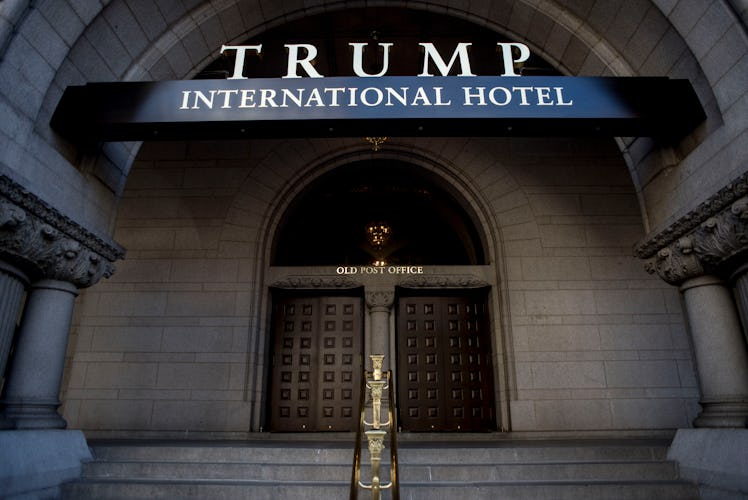
Trump Lost An Attempt To Stop A Lawsuit About His Business Conflicts
In September 2017, attorneys for President Donald Trump filed a motion to dismiss a lawsuit against him, which alleged that he had used the office of the presidency to profit his D.C. hotel. The allegations, if true, would be in violation of the Emoluments Clause of the Constitution. On Wednesday, March 28, a District Court judge in Maryland ruled that an emoluments case against Trump is continuing in court after initially being challenged by the Justice Department (DOJ). Elite Daily has reached out to the White House for response, but did not hear back at time of publication.
Judge Peter Messitte in Greenbelt, Maryland, rejected one of the DOJ's arguments that he dismiss the lawsuit, and agreed to schedule another hearing, according to Bloomberg and other published reports. The case in Maryland pertains to the Trump International Hotel in Washington, the ownership of which the president has insisted does not conflict with the office. The lawsuit was filed in the first few days of Trump's presidency in January 2017 by the state of Maryland in conjunction with Citizens for Responsibility and Ethics in Washington (CREW). The DOJ, which is representing Trump in the case, had not commented on the judge's ruling as of press time.
"While the Trump Organization is not a party to the lawsuit, the Court’s decision today does significantly narrow the scope of the case. The Court has yet to rule on several additional arguments, which we believe should result in a complete dismissal," the Trump Organization said in a statement about the ruling, per The Washington Post.
Trump drew criticism early in his presidency for the potentiality of business conflicts. Even after the first emoluments lawsuit was filed, questions loomed about how his businesses in China might influence his relationship with the government there. China granted preliminary approval in March 2017 for 38 new Trump trademarks, which would potentially allow The Trump Organization to expand a host of businesses there, according to The Washington Post.
Dan Plane, a Hong Kong intellectual property consultant, told the Post he thought the approval was unusual. “For all these marks to sail through so quickly and cleanly, with no similar marks, no identical marks, no issues with specifications — boy, it’s weird,” he said.
Trump's attorneys argued that the Maryland District Court lacked the standing to sue the president, per Trump's motion to dismiss.
“In absence of Congressional approval, this Court holds that it may review the actions of the President to determine if they comply with the law,” Judge Messitte wrote in his decision, adding,
It can hardly be gainsaid that a large number of Maryland and District of Columbia residents are being affected and will continue to be affected when foreign and state governments choose to stay, host events, or dine at the Hotel rather than at comparable Maryland or District of Columbia establishments, in whole or in substantial part simply because of the President’s association with it ... The thrust of the President’s argument that only Congress can act is particularly concerning. Suppose a majority (simple? two-thirds?) of Congress (the House? the Senate? both?) is controlled by one party — that of the President. And suppose the Congress never undertakes to approve or disapprove the President’s receipt of such 'emoluments.' The President could continue to receive unlimited 'emoluments' from foreign and state governments without the least oversight and with absolute impunity.
In January, arguments before Messitte pointed to the financial success of Trump's D.C. hotel as an indicator that he allegedly violated the Constitution, per a BuzzFeed report. Trump’s hotel in downtown D.C. opened in October 2016, and although once he became president he gave control of the Trump Organization to his sons, Donald Jr. and Eric, he did not divest his interests in the business. Additionally, promises that Trump would donate profits from any foreign governments staying in his hotel to the U.S. Treasury went unkept until, in late February 2018, the Trump Organization claimed it made the donations, although it declined to provide details.
The suit is one of three alleging that Trump is violating the emoluments clause. U.S. District Court Judge George Daniels ruled last year that a suit did not have basis in New York.
“As the only political branch with the power to consent to violations of the Foreign Emoluments Clause, Congress is the appropriate body to determine whether, and to what extent, Defendant’s conduct unlawfully infringes on that power,” Judge Daniels wrote in his decision. “If Congress determines that an infringement has occurred, it is up to Congress to decide whether to challenge or acquiesce to Defendant’s conduct. As such, this case presents a non-justiciable political question.”
Trump is reportedly likely to appeal the decision in Maryland, but members of CREW took to Twitter to declare victory. As it stands, the case is far from over.